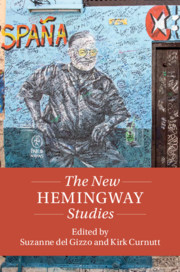Book contents
- The New Hemingway Studies
- Twenty-First-Century Critical Revisions
- The New Hemingway Studies
- Copyright page
- Contents
- Contributors
- Introduction Hemingway in the New Millennium
- Part I The Textual Hemingway
- Chapter 1 Shaping the Life
- Chapter 2 Hemingway and Textual Studies
- Chapter 3 Correspondence and the Everyday Hemingway
- Chapter 4 Object Studies and Keepsakes, Artifacts, and Ephemera
- Chapter 5 Digital Hemingway
- Part II Identities
- Part III Global Engagements
- Works Cited
- Index
Chapter 3 - Correspondence and the Everyday Hemingway
from Part I - The Textual Hemingway
Published online by Cambridge University Press: 30 August 2020
- The New Hemingway Studies
- Twenty-First-Century Critical Revisions
- The New Hemingway Studies
- Copyright page
- Contents
- Contributors
- Introduction Hemingway in the New Millennium
- Part I The Textual Hemingway
- Chapter 1 Shaping the Life
- Chapter 2 Hemingway and Textual Studies
- Chapter 3 Correspondence and the Everyday Hemingway
- Chapter 4 Object Studies and Keepsakes, Artifacts, and Ephemera
- Chapter 5 Digital Hemingway
- Part II Identities
- Part III Global Engagements
- Works Cited
- Index
Summary
In “Correspondence and the Everyday Hemingway,” Verna Kale and Sandra Spanier examine what letters as opposed to literary biography reveal about a writer. As two guiding forces behind the Letters Project – the collaborative effort producing a multivolume scholarly edition of Hemingway’s correspondence, which published its first volume in 2011 and is not scheduled to conclude until 2043 – Kale and Spanier are in a unique position to assess how the correspondence’s availability has expanded our notions of quotidian Hemingway. As they note, there has always been an interest in Hemingway’s letters: as early as 1930, correspondents attempted to sell their letters from him to collectors to cash in on his fame. But his private correspondence wasn’t officially available until 1981 with Carlos Baker’s Selected Letters, a book that immediately impacted Hemingway scholarship. That volume, however, collects less than 10 percent of the 6,000 letters catalogued by the Hemingway Project and gives disproportional attention to 1922–1926 and 1952, somewhat distorting impressions of his life and career; nearly 85 percent of the material the Project will gather has never been published before.
Keywords
- Type
- Chapter
- Information
- The New Hemingway Studies , pp. 47 - 62Publisher: Cambridge University PressPrint publication year: 2020

